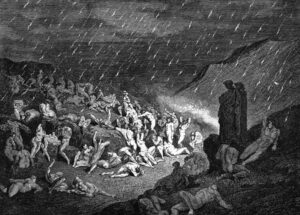A war which is destroying men as they have never been destroyed before, from which at the best the nations will emerge permanently degraded in their stock, poorer in physique, duller in intelligence, weaker in will than they went in, this war is to be protracted until the whole manhood of Europe is decimated, in order — in order to what? Let us ask in detail.
In order, we are told, that the Germans may ‘feel they are beaten.’ And then? They will be good in future? They will admit they were wrong? They will lick the hand that chastised them? Who believes it? The more completely they are beaten, the more obstinately they will be set on recovery. When France was beaten to the dust in 1870, did she repent for having provoked the war? On the contrary, she gathered up her forces for revenge. And Germany will do the same.G. Lowes Dickinson (1862-1932) British political scientist and philosopher [Goldsworthy "Goldie" Lowes Dickinson]
“The War and the Way Out: A Further Consideration,” sec. 2, Atlantic Monthly (Apr 1915)
(Source)
Quotations about:
vengeance
Note not all quotations have been tagged, so Search may find additional quotes on this topic.
O endless wrath of God: how utterly
thou shouldst become a terror to all men
who read the frightful truths revealed to me![O vendetta di Dio, quanto tu dei
esser temuta da ciascun che legge
ciò che fu manifesto a li occhi mei!]Dante Alighieri (1265-1321) Italian poet
The Divine Comedy [Divina Commedia], Book 1 “Inferno,” Canto 14, l. 16ff (14.16-18) (1309) [tr. Ciardi (1954), l. 13ff]
(Source)
On entering the Seventh Circle, third ring, and seeing flames drifting down from the sky, landing on the damned trapped there (blasphemers, sodomites, usurers).
(Source (Italian)). Alternate translations:
O Vengeance dire of God, how much you should
By ev'ry one be dreaded, when he reads
What to my eyes was manifestly shewn!
[tr. Rogers (1782)]
Vengeance of Heav'n! I saw thy hand severe
(Your doom! ye Atheists and Blasphemers, hear!)
O'er many a naked soul the scourge display!
[tr. Boyd (1802), st. 4]
Vengeance of Heav’n! Oh! how shouldst thou be fear’d
By all, who read what here my eyes beheld!
[tr. Cary (1814)]
O vengeance of the Eternal! how ought they
Who read the tale, thy workings mark with awe,
In that my troubled eyes did here survey!
[tr. Dayman (1843)]
O vengeance of God! how shouldst thou be feared by every one who reads what was revealed to my eyes!
[tr. Carlyle (1849)]
Avenging power of God! how should each fear,
Who reads of this, arresting with surprise,
The sight which manfestly met mine eyes!
[tr. Bannerman (1850)]
Oh, God's great vengeance! with what heavy dread
Thou should'st be fear'd by ev'ry one who reads
What to mine eyes so manifest was made!
[tr. Johnston (1867), l. 16ff]
Vengeance of God, O how much oughtest thou
By each one to be dreaded, who doth read
That which was manifest unto mine eyes!
[tr. Longfellow (1867)]
O vengeance of God, how oughtest thou to be feared by each one who reads that which was manifested to my eyes!
[tr. Butler (1885)]
O vengeance of great God! with what a fear
Thou shouldst be held by all who read in awe
That which before my eyes was visibly clear!
[tr. Minchin (1885)]
O vengeance of God, how much thou oughtest to be feared by every one who readeth that which was manifest unto mine eyes!
[tr. Norton (1892)]
O Vengeance of God, how mightily shouldst thou be feared by all who read that which was given mine eyes to look upon!
[tr. Sullivan (1893)]
Vengeance of God! In what great fear and trembling
Should'st thou be held by each who reads the story
Of that which to my eyes was manifested.
[tr. Griffith (1908)]
O vengeance of God, how must thou be feared by everyone who reads what was plain before my eyes!
[tr. Sinclair (1939)]
O chastisement of God, how oughtest thou
To be of each one feared who reads with awe
What to my eyes was manifested now.
[tr. Binyon (1943)]
Fearful indeed art thou, vengeance of God!
He that now reads what mine own eyes with awe
Plainly beheld, well may he dread thy rod!
[tr. Sayers (1949)]
O vengeance of God, how much should you be feared by all who read what was revealed to my eyes!
[tr. Singleton (1970)]
O just revenge of God! how awesomely
you should be feared by everyone who reads
these truths that were revealed to my own eyes!
[tr. Musa (1971)]
O vengeance of the Lord, how you should be
dreaded by everyone who now can read
whatever was made manifest to me!
[tr. Mandelbaum (1980)]
O vengeance of God, how much you ought
To be feared by everyone who reads
What was there manifested to my eyes.
[tr. Sisson (1981)]
O vengeance of God, how much
Should you be feared by all of those who read
What my eyes saw!
[tr. Pinsky (1994)]
O vengeance of God, how much must you be feared by everyone who reads what was made manifest to my eyes!
[tr. Durling (1996)]
O God’s vengeance, how what was shown to my sight should be feared, by all who read!
[tr. Kline (2002)]
Great God! Your vengeance must be rightly feared
by all who read the verses I compose
to say what there was straight before my eyes.
[tr. Kirkpatrick (2006)]
O vengeance of God, how much
should you be feared by all who read
what now I saw revealed before my eyes!
[tr. Hollander/Hollander (2007)]
But O God's awful vengeance! Reading this,
You all should tremble with fear for what my eyes
Were shown, dark and terrible, a burning brilliance!
[tr. Raffel (2010)]
Holy Vengeance, how you must
Be feared by all who read what now I saw!
[tr. James (2013)]
MACBETH: It will have blood, they say; blood will have blood.
William Shakespeare (1564-1616) English dramatist and poet
Macbeth, Act 3, sc. 4, l. 152 (3.4.152) (1606)
(Source)
To Lady Macbeth.
And if we do but watch the hour,
There never yet was human power
Which could evade, if unforgiven,
The patient search and vigil long
Of him who treasures up a wrong.
A physician would not cure his patients more effectually if he were angry with them for being ill, and the criminal law is not more effective when it is inspired by anger against the criminal. The criminal presents a problem, psychological, educational, sociological, and economic; this difficult problem is not best handled in a state of blind rage. All arguments for corporal punishment spring from anger, not from scientific understanding. As men become more scientific, such barbaric practices will be no longer tolerated.
Bertrand Russell (1872-1970) English mathematician and philosopher
“On corporal punishment,” New York American (1932-09-07)
(Source)
Who talked you into cutting off the guy’s nose,
When some other part clearly curls your wife’s toes?
You dolt, she’s not lost what makes Deiphobus dear:
It’s his dick that made your wife holler and cheer.[Quis tibi persuasit naris abscidere moecho?
Non hac peccatum est parte, marite, tibi.
Stulte, quid egisti? nihil hic tibi perdidit uxor,
Cum sit salva tui mentula Deiphobi.]Martial (AD c.39-c.103) Spanish Roman poet, satirist, epigrammatist [Marcus Valerius Martialis]
Epigrams [Epigrammata], Book 3, epigram 85 (3.85) (AD 87-88) [tr. Ericsson (2005)]
The name Deiphobus is used here metaphorically. In myth he was son of Priam, and wed Helen after Paris. Menelaus, Helen's first husband, mutilated him. He is referenced in accounts of the Trojan Wars, as well as the Aenead.
Compare to 3.85. (Source (Latin)). Alternate translations:
Offended lord, what could thee discompose,
So cruelly to lop th' offender's nose?
That suff'ring limb, as thine, was innocent:
Nor feels the paramour the punishment.
Ne'er canst thou hope t' extingish either fire,
While the incendiary remains entire.
[tr. Elphinston (1782), Book 6, Part 2, ep. 35]
Who persuaded you to cut off the nose of your wife's gallant? Wretched husband, that was not the part which outraged you. Fool, what have you done? Your wife has lost nothing by the operation, since that which pleased her in your friend Deiphobus is still safe.
[tr. Bohn's Classical (1859)]
Who induced you to cut off the adulterer's nose? It was not by this party, husband, you were sinned against. You fool, what have you done? Your wife has lost nothing in this quarter, seeing the organ of your Deiphobus is safe and sound.
[tr. Ker (1919)]
What ailed you to cut off the young gallant’s nose,
And leave all unscathed the prime source of your woes?
[tr. Pott & Wright (1921)]
Good husband, who persuaded you
to cut off the adulterer's nose?
What good did that do, you fool?
Your wife loses nothing at all
as long as the man keeps his tool.
[tr. Bovie (1970)]
Who persuaded you to cut off the adulterer's nose?
No offence against you has been committed by this part, my good husband.
Idiot, what have you done? Your wife has lost nothing here,
Since your Deiphobus's cock is safe and sound.
[tr. Shackleton Bailey (1993)]
You have robbed the young gallant of nostrils and ears,
And his face now of both is bereft.
But your vengeance remains incomplete it appears;
He has still got another part left.[Foedasti miserum, marite, moechum,
Et se, qui fuerant prius, requirunt
Trunci naribus auribusque voltus.
Credis te satis esse vindicatum?
Erras: iste potest et irrumare.]Martial (AD c.39-c.103) Spanish Roman poet, satirist, epigrammatist [Marcus Valerius Martialis]
Epigrams [Epigrammata], Book 2, epigram 83 (2.83) (AD 86) [tr. Pott & Wright (1921)]
(Source)
(Source (Latin)). Alternate translations:
Thou hast deform'd the poor gallant;
Nor could they justice mercy grant.
His nose so slit and ear so tore,
Now seek in vain the grace they wore.
Now vengeance boasts her ample due.
Fool! mayn't the foe the charge renew?
[tr. Elphinston (1782), 6.2.34]
Husband, you have disfigured the wretched gallant, and his countenance, deprived of nose and ears, regrets the loss of its original form. Do you think that you are sufficiently avenged? You are mistaken: something still remains.
[tr. Bohn's Classical (1859)]
You have disfigured, O' husband, the wretched adulterer, and his face, shorn of nose and ears, misses its former self. Do you believe you are still sufficiently avenged? You mistake; he still has other activities.
[tr. Ker (1919)]
The cuckold finally caught the culprit,
Boxed his ears and broke his jaw.
But hasn't he missed the point?
[tr. Murray (1967)]
Oh husband, you have disfigured your wife's
unhappy seducer; with his nose and ears your knife's
satisfied its user. How his face misses
its familiar features! This revenge, it meets your
requirements? He can still ram it up their asses.
[tr. Bovie (1970)]
You took a dire revenge, one hears,
On him who stole your wife,
By cutting off his nose and ears --
It's marred his social life.
Still there's one thing you didn't get
And that could cause you trouble yet.
[tr. O. Pitt-Kethley (1987)]
Husband, you mutilated your wife's unhappy lover, and his face, maimed of nose and ears, misses its former self. Do you suppose you are sufficiently avenged? You err. He can also give suck.
[tr. Shackleton Bailey (1993)]
You have disfigured your wife's unfortunate lover, O husband: his face, deprived of nose and ears, vainly seeks its former state. Do you think you have sufficiently taken revenge? You're wrong. The man can also fuck in the mouth.
[tr. Williams (2004)]
The man gave you the cuckold's horn?
His ears and nose your knife has shorn.
Have you deprived him of a screw?
Just ask his mouth what it can do.
[tr. Wills (2007)]
Husband, you maimed your wife's poor lover.
Shorn of its nose and ears, his face
looks vainly for its former grace.
Do you believe you've done enough?
You're wrong. He still can be sucked off.
[tr. McLean (2014)]
A tinker’s debt is always paid:
Once for any simple trade.
Twice for freely given aid.
Thrice for any insult made.
And you, my Tyrians,
harry with hatred all his line, his race to come:
make that offering to my ashes, send it down below.
No love between our peoples, ever, no pacts of peace!
Come rising up from my bones, you avenger still unknown,
to stalk those Trojan settlers, hunt with fire and iron,
now or in time to come, whenever the power is yours.
Shore clash with shore, sea against sea, and sword
against sword — this is my curse — war between all
our peoples, all their children, endless war![Tum vos, o Tyrii, stirpem et genus omne futurum
exercete odiis, cinerique haec mittite nostro
munera. Nullus amor populis, nec foedera sunto.
Exoriare aliquis nostris ex ossibus ultor,
qui face Dardanios ferroque sequare colonos,
nunc, olim, quocumque dabunt se tempore vires.
Litora litoribus contraria, fluctibus undas
imprecor, arma armis; pugnent ipsique nepotesque.]Virgil (70-19 BC) Roman poet [b. Publius Vergilius Maro; also Vergil]
The Aeneid [Ænē̆is], Book 4, l. 622ff (4.622-629) [Dido] (29-19 BC) [tr. Fagles (2006), l. 775ff]
(Source)
Dido's deathbed curse, "foretelling" the Punic Wars between her Carthage and Aeneas' descendants in Rome.
(Source (Latin)). Alternate translations:
O Tyrians, strive this Nation to supplant
With restless wars this to my ashes grant:
Never joyn leagues, contract no amities,
And from our bones let some revenger rise,
Who Trojans may pursue with fire, and sword,
Ah, may when ever time shall strength afford,
Shores shores oppose, seas seas, our stocks debate
With arms gainst arms maintaine, I imprecate.
[tr. Ogilby (1649)]
And you, my Tyrians, ev'ry curse fulfil.
Perpetual hate and mortal wars proclaim,
Against the prince, the people, and the name.
These grateful off'rings on my grave bestow;
Nor league, nor love, the hostile nations know!
Now, and from hence, in ev'ry future age,
When rage excites your arms, and strength supplies the rage
Rise some avenger of our Libyan blood,
With fire and sword pursue the perjur'd brood;
Our arms, our seas, our shores, oppos'd to theirs;
And the same hate descend on all our heirs!
[tr. Dryden (1697)]
And, Tyrians, you through time to come
His seed with deathless hatred chase:
Be that your gift to Dido's tomb:
No love, no league 'twixt race and race.
Rise from my ashes, scourge of crime,
Born to pursue the Dardan horde
To-day, to-morrow, through all time,
Oft as our hands can wield the sword:
Fight shore with shore, fight sea with sea,
Fight all that are or e'er shall be!
[tr. Conington (1866)]
And ye, O Tyrians, follow with your hate
His seed, and all his future race! Be this
Your offering on my tomb! No love, no league
Between you ! Oh, may some avenger rise
From out my ashes, who with fire and sword
Shall chase these Dardan settlers, now, and in
The coming time, wherever strength is given;
Shores with shores fighting, waves with waves, and
arms With arms, -- they and their last posterity
[tr. Cranch (1872)]
And you, O Tyrians, hunt his seed with your hatred for all ages to come; send this guerdon to our ashes. Let no kindness nor truce be between the nations. Arise out of our dust, O unnamed avenger, to pursue the Dardanian settlement with firebrand and steel. Now, then, whensoever strength shall be given, I invoke the enmity of shore to shore, wave to water, sword to sword; let their battles go down to their children's children.
[tr. Mackail (1885)]
And ye, O Tyrians, 'gainst his race that is, and is to be,
Feed full your hate! When I am dead send down this gift to me:
No love betwixt the peoples twain, no troth for anything!
And thou, Avenger of my wrongs, from my dead bones outspring,
To bear the fire and the sword o'er Dardan-peopled earth
Now or hereafter; whensoe'er the day brings might to birth.
I pray the shore against the shore, the sea against the sea,
The sword 'gainst sword -- fight ye that are, and ye that are to be!
[tr. Morris (1900)]
Them and their children's children evermore
Ye Tyrians, with immortal hate outwear.
This gift -- 'twill please me best -- for Dido's shade prepare.
This heritage be yours; no truce nor trust
'Twixt theirs and ours, no union or accord
Arise, unknown Avenger from our dust;
With fire and steel upon the Dardan horde
Mete out the measure of their crimes' reward.
To-day, to-morrow, for eternity
Fight, oft as ye are able -- sword with sword,
Shore with opposing shore, and sea with sea;
Fight, Tyrians, all that are, and all that e'er shall be!
[tr. Taylor (1907)], st. 81-82, l. 720ff]
And -- O ye Tyrians! I
sting with your hatred all his seed and tribe
forevermore. This is the offering
my ashes ask. Betwixt our nations twain,
No love! No truce or amity! Arise,
Out of my dust, unknown Avenger, rise!
To harry and lay waste with sword and flame
those Dardan settlers, and to vex them sore,
to-day, to-morrow, and as long as power
is thine to use! My dying curse arrays
shore against shore and the opposing seas
in shock of arms with arms. May living foes
pass down from sire to son insatiate war
[tr. Williams (1910)]
Then do ye, O Tyrians, pursue with hate his whole stock and the race to come, and to my dust offer this tribute! Let no love nor league be between the nations. Arise from my ashes, unknown avenger! to chase with fire and sword the Dardan settlers, to-day, hereafter, whenever strength be given! May shore with shore clash, I pray, waters with waters, arms with arms; may they have war, they and their children's children!
[tr. Fairclough (1916)]
And you, O Tyrians, hate, and hate forever
The Trojan stock. Offer my dust this homage.
No love, no peace, between these nations, ever!
Rise from my bones, O great unknown avenger,
Hunt them with fire and sword, the Dardan settlers,
Now, then, here, there, wherever strength is given.
Shore against shore, wave against wave, and war,
War after war, for all the generations.
[tr. Humphries (1951)]
Let you, my Tyrians, sharpen your hatred upon his children
And all their seed for ever: send this as a present to
My ghost. Between my people and his, no love, no alliance!
Rise up from my dead bones, avenger! Rise up, one
To hound the Trojan settlers with fire and steel remorselessly,
Now, some day, whenever the strength for it shall be granted!
Shore to shore, sea to sea, weapon to weapon opposed --
I call down a feud between them and us to the last generation!
[tr. Day-Lewis (1952)]
Then, Tyrians, hunt down
with hatred all his sons and race to come;
send this as offering unto my ashes.
Do not let love or treaty tie our peoples.
May an avenger rise up from my bones,
one who will track with firebrand and sword
the Dardan settlers, now and in the future,
at any time that ways present themselves.
I call your shores to war against their shores,
your waves against their waves, arms with their arms.
Let them and their sons' sons learn what is war.
[tr. Mandelbaum (1971)]
Then, O my Tyrians, besiege with hate
His progeny and all his race to come:
Make this your offering to my dust. No love,
No pact must be between our peoples; No,
But rise up from my bones, avenging spirit!
Harry with fire and sword the Dardan countrymen
Now, or hereafter, at whatever time
The strength will be afforded. Coast with coast
In conflict, I implore, and sea with sea,
And arms with arms: may they contend in war,
Themselves and all the children of their children!
[tr. Fitzgerald (1981), l. 865ff]
As for you, my Tyrians, you must pursue with hatred the whole line of his descendants in time to come. Make that your offering to my shade. Let there be no love between our peoples and no treaties. Arise from my dead bones, O my unknown avenger, and harry the race of Dardanus with fire and sword wherever they may settle, now and in the future, whenever our strength allows it. I pray that we may stand opposed, shore against shore, sea against sea, and sword against sword. Let there be war between the nations and between their sons forever.
[tr. West (1990)]
Then, O Tyrians, pursue my hatred against his whole line
and the race to come, and offer it as a tribute to my ashes.
Let there be no love or treaties between our peoples.
Rise, some unknown avenger, from my dust, who will pursue
the Trojan colonists with fire and sword, now, or in time
to come, whenever the strength is granted him.
I pray that shore be opposed to shore, water to wave,
weapon to weapon: let them fight, them and their descendants.
[tr. Kline (2002)]
And you, my Tyrians, must persecute his line
Throughout the generations -- this your tribute
To Dido's ashes. May treaties never unite
These nations, may no love ever be lost between them
And from my bones may some avenger rise up
To harry the Trojans with fire and sword,
Now and whenever we have the power.
May coast oppose coast, waves batter waves,
Arms clash with arms, may they be ever at war,
They themselves and their children forever.
[tr. Lombardo (2005)]
Tyrians, you must torment his sons
and all his future race. Make this offering to my ashes.
Let there be no love or treaties between us.
Rise from my bones, unknown avenger,
hunt the Dardan colonists with flames and swords,
now or any times there's strength to strike!
My curse is this: our lands, our seas, our swords will clash.
The Trojans will fight wars for generations.
[tr. Bartsch (2021)]
Maybe there really is no satisfaction in revenge, but I can tell you one thing for sure: There’s no satisfaction in letting someone get away with ruining your life, either.
Women are stripped to the skin in the presence of leering, white-skinned, black-hearted brutes and lashed into insensibility and strangled to death from the limbs of trees. A girl child of fifteen years was lynched recently by these brutal bullies. Where has justice fled? The eloquence of Wendell Phillips is silent now. John Brown’s body lies moldering in the grave. But will his spirit lie there moldering, too? Brutes, inhuman monsters — you heartless brutes — you whom nature forms by molding you in it, deceive not yourselves by thinking that another John Brown will not arise.
Lucy Parsons (1851-1942) American labor organizer, anarchist, orator [a.k.a. Lucy Gonzalez]
“Southern Lynching” (Apr 1892)
(Source)
Then forth they led Melanthius, and began
Their bloody work; they lopp’d away the man,
Morsel for dogs! then trimm’d with brazen shears
The wretch, and shorten’d of his nose and ears;
His hands and feet last felt the cruel steel:
He roar’d, and torments gave his soul to hell.
They wash, and to Ulysses take their way:
So ends the bloody business of the day.[ἐκ δὲ Μελάνθιον ἦγον ἀνὰ πρόθυρόν τε καὶ αὐλήν:
475τοῦ δ᾽ ἀπὸ μὲν ῥῖνάς τε καὶ οὔατα νηλέϊ χαλκῷ
τάμνον, μήδεά τ᾽ ἐξέρυσαν, κυσὶν ὠμὰ δάσασθαι,
χεῖράς τ᾽ ἠδὲ πόδας κόπτον κεκοτηότι θυμῷ.
οἱ μὲν ἔπειτ᾽ ἀπονιψάμενοι χεῖράς τε πόδας τε
εἰς Ὀδυσῆα δόμονδε κίον, τετέλεστο δὲ ἔργον.]Homer (fl. 7th-8th C. BC) Greek author
The Odyssey [Ὀδύσσεια], Book 22, l. 474ff (22.474) (c. 700 BC) [tr. Pope (1725)]
(Source)
Telemachus and company executing the treacherous goatherd, Melanthius, the last of the deaths on Odysseus' homecoming. (Source (Greek)). Alternate translations:
Then fetch’d they down Melanthius, to fulfill
The equal execution; which was done
In portal of the hall, and thus begun:
They first slit both his nostrils, cropp’d each ear,
His members tugg’d off, which the dogs did tear
And chop up bleeding sweet; and, while red-hot
The vice-abhorring blood was, off they smote
His hands and feet; and there that work had end.
Then wash’d they hands and feet that blood had stain’d,
And took the house again.
[tr. Chapman (1616)]
Then down they dragg’d Melantheus, and his nose
And ears with cruel steel from ’s head they tear,
And brake his arms and legs with many blows,
And to the dogs to eat they throw his gear.
Their work now done, they wash’d their hands and feet,
And to Ulysses in the hall they went,
[tr. Hobbes (1675), l. 417]
And now through vestibule and hall
They led Melanthius forth. With ruthless steel
They pared away his ears and nose, pluck’d forth
His parts of shame, destin’d to feed the dogs,
And, still indignant, lopp’d his hands and feet.
Then, laving each his feet and hands, they sought
Again Ulysses; all their work was done,
[tr. Cowper (1792), l. 548ff]
Then to the courtyard they Melanthius draw,
Lop with knife his nose and ears, and cast
His manhood to the dogs, to eat up raw,
And his limbs dock with iron -- for so vast
Burned the grim wrath within them. At the last,
Washed in pure water, and with hands and feet
Clean from the red gore, to the king they passed;
And all was over, and the work complete.
[tr. Worsley (1861), st. 57]
Then dragged they Melanthius forth to the porch and courtyard:
From him nose and ears with the ruthless brass
They sheared: and threw his manhood to the dogs:
And chopped off his hands and feet in vengeful rage!
This done, they washed their hands and feet; and hied
To Odysseus int he house: and the work was done.
[tr. Bigge-Wither (1869)]
Melantius
Was through the corridor and hall led out.
The armed men his nostrils and his ears
With pitiless blade excis'd: his very groin
Was to the rav'nous maw of hounds laid bare;
And both his hands and feet, -- so hotly raged
Avenging wrath! -- were from his body hewn.
Telemachus, at length, and both the herds
When they their hands and feet by blood defil'd
Had in ablusion cleans'd, the house regain'd
And there Ulysses join'd. The work had now
Its full completion reach'd.
[tr. Musgrave (1869), l. 755ff]
Then they led out Melanthius through the doorway and the court, and cut off his nostrils and his ears with the pitiless sword, and drew forth his vitals for the dogs to devour raw, and cut off his hands and feet in their cruel anger. Thereafter they washed their hands and feet, and went into the house to Odysseus, and all the adventure was over.
[tr. Butcher/Lang (1879)]
Then did they bring Melanthius through the port and into the court,
And they cropped with the ruthless brass the ears and the nose from his face,
And drew out his privy parts for the dogs to eat raw in the place,
And hewed off his hands and his feet in their fierce and fell intent.
Then their hands and their feet they washed, and into the house they went,
And came unto Odysseus, and done was the work of the day.
[tr. Morris (1887)]
Then forth they led Melanthius across the porch and yard. With ruthless sword they lopped off his nose and and ears, pulled out his bowels to be eaten raw by dogs, and in their rage cut off his hands and feet. Afterwards, washing clean their own hands and their feet, they went to meet Odysseus in the house, and all the work was done.
[tr. Palmer (1891)]
As for Melanthius, they took him through the cloister into the inner court. There they cut off his nose and his ears; they drew out his vitals and gave them to the dogs raw, and then in their fury they cut off his hands and his feet. When they had done this they washed their hands and feet and went back into the house, for all was now over.
[tr. Butler (1898)]
As for Melanthios, they took him through the room into the inner court. There they cut off his nose and his ears; they drew out his vitals and gave them to the dogs raw, and then in their fury they cut off his hands and his feet. When they had done this they washed their hands and feet and went back into the house, for all was now over.
[tr. Butler (1898), rev. Power/Nagy]
Then forth they led Melanthius through the doorway and the court, and cut off his nostrils and his ears with the pitiless bronze, and drew out his vitals for the dogs to eat raw, and cut off his hands and his feet in their furious wrath. Thereafter they washed their hands and feet, and went into the house to Odysseus, and the work was done.
[tr. Murray (1919)]
Melanthius they dragged through the entry and the court, sliced his nose and ears with their cruel swords and tore out his privates, which they fed raw to the dogs. Their spite made them also cut off his hands and feet, after which they rinsed their own feet and hands and rejoined Odysseus in the house, all their achievement perfected.
[tr. Lawrence (1932)]
Next Melanthius was dragged out across the court and through the gate. There with a sharp knife they sliced his nose and ears off; they ripped away his privy parts as raw meat for the dogs, and in their fury they lopped off his hands and feet. Then, after washing their own hands and feet, they went back indoors to Odysseus and the business was finished.
[tr. Rieu (1946)]
From the storeroom to the court they brought Melanthios, chopped with swords to cut his nose and ears off, pulled off his genitals to feed the dogs and raging hacked his hands and feet away. As their own hands and feet called for a washing, they went indoors to Odysseus again. Their work was done.
[tr. Fitzgerald (1961)]
They took Melanthios along the porch and the courtyard.
They cut off, with the pitiless bronze, his nose and his ears,
tore off his private parts and gave them to the dogs to feed on
raw, and lopped off his hands and feet, in fury of anger.
Then, after they had washed their own hands and feet clean,
they went into the house of Odysseus. Their work was ended.
[tr. Lattimore (1965)]
Melanthius was led outside the door into the court; with savage bronze they hacked off both his ears and nose, cut off his genitals -- a raw meal for the dogs -- and then, with frenzied hearts, hacked off his hands and feet. Their work complete, as soon as they had washed their hands and feet, again they joined Odysseus in the house.
[tr. Mandelbaum (1990)]
Melanthius?
They hauled him out through the doorway, into the court,
lopped his nose and ears with a ruthless knife,
tore his genitals out for the dogs to eat raw
and in manic fury hacked off hands and feet. Then,
once they'd washed their own hands and feet,
they went inside again to join Odysseus.
Their work was done with now.
[tr. Fagles (1996)]
Then they brought Melanthius outside,
And in their fury they sliced off
His nose and ears with cold bronze
And pulled his genitals out by the root --
Raw meat for the dogs -- and chopped off
His hands and feet. This done,
They washed their own hands and feet
And went back into their master's great hall.
[tr. Lombardo (2000), l. 498ff]
Leading Melánthios out to the portico, then to the courtyard,
there with the pitiless bronze they cut off his nose and his ears, then
tore out his privates and gave them raw to the dogs to be eaten,
also chopped off his hands and his feet in the wrath of their spirits.
Finally, when they had cleansed their hands and their feet of the carnage,
they went into the house of Odysseus; the labor was finished.
[tr. Merrill (2002)]
Next they dragged Melanthius out through the hall entrance and across the court. There with a pitiless knife they sliced his nose and ears off; they ripped away his genitals as raw meat for the dogs, and in their fury they lopped off his hands and feet. Then, after washing their own hands and feet, they went back indoors to Odysseus and the business was finished.
[tr. DCH Rieu (2002)]
Then they dragged Melanthius out through the door into the yard, and with the pitiless bronze sliced off his nose and ears, tore away his genitals to be raw meat for the dogs to eat, and in their raging fury lopped off his hands and feet as well. After this they scoured the gore from their hands and feet, and went into the house to meet Odysseus, their work done.
[tr. Verity (2016)]
Then the men took Melanthius outside and with curved bronze cut off his nose and ears and ripped away his genitals, to feed raw to the dogs. Still full of rage, they chopped his hands and feet off. Then they washed their own, and they went back inside.
[tr. Wilson (2017)]
Then they brought out Melanthios, ripped out his genitals and fed them to the dogs, and cut off all his extremities. That done, they washed off their hands and feet, and went back in. The work was done.
[tr. Green (2018)]
Then they brought Melanthius out through the doorway
into the yard. With pitiless bronze they sliced off
his nose and ears, then ripped off his cock and balls
as raw meat for dogs to eat, and in their fury
hacked off his hands and feet. After they’d done that,
they washed their hands and feet and went inside the house,
returning to Odysseus. Their work was finished.
[tr. Johnston (2019), l. 586ff]
Come, weave us a scheme so I can pay them back!
Stand beside me, Athena, fire me with daring, fierce
as the day we ripped Troy’s glittering crown of towers down.
Stand by me — furious now as then, my bright-eyed one —
and I would fight three hundred men, great goddess,
with you to brace me, comrade-in-arms in battle![ἀλλ᾽ ἄγε μῆτιν ὕφηνον, ὅπως ἀποτίσομαι αὐτούς:
πὰρ δέ μοι αὐτὴ στῆθι, μένος πολυθαρσὲς ἐνεῖσα,
οἷον ὅτε Τροίης λύομεν λιπαρὰ κρήδεμνα.
αἴ κέ μοι ὣς μεμαυῖα παρασταίης, γλαυκῶπι,
καί κε τριηκοσίοισιν ἐγὼν ἄνδρεσσι μαχοίμην
σὺν σοί, πότνα θεά, ὅτε μοι πρόφρασσ᾽ ἐπαρήγοις]Homer (fl. 7th-8th C. BC) Greek author
The Odyssey [Ὀδύσσεια], Book 13, l. 386ff (13.386) [Odysseus] (c. 700 BC) [tr. Fagles (1996)]
(Source)
(Source (Greek)). Alternate translations:
Advise then means to the reveng’d events
We both resolve on. Be thyself so kind
To stand close to me, and but such a mind
Breathe in my bosom, as when th’ Ilion tow’rs
We tore in cinders. O if equal pow’rs
Thou wouldst enflame amidst my nerves as then,
I could encounter with three hundred men,
Thy only self, great Goddess, had to friend,
In those brave ardors thou wert wont t’ extend!
[tr. Chapman (1616)]
But now, O Pallas, find out some device,
How of the suitors best I may be rid,
And by me stand, inspiring courage stout,
As when we pull’d Troy’s head-gear off her head.
For then to master them I should not doubt,
Three hundred though they were.
[tr. Hobbes (1675), l. 347ff]
Vouchsafe the means of vengeance to debate,
And plan with all thy arts the scene of fate.
Then, then be present, and my soul inspire,
As when we wrapp'd Troy's heaven-built walls in fire.
Though leagued against me hundred heroes stand.
Hundreds shall fall, if Pallas aid my hand.
[tr. Pope (1725)]
Come then -- Devise the means; teach me, thyself,
The way to vengeance, and my soul inspire
With daring fortitude, as when we loos’d
Her radiant frontlet from the brows of Troy.
Would’st thou with equal zeal, O Pallas! aid
Thy servant here, I would encounter thrice
An hundred enemies, let me but perceive
Thy dread divinity my prompt ally.
[tr. Cowper (1792), l. 466]
Come, weave me counsel neither void nor vain,
That red vengeance reap till not a man remain!
But stand thou near, and such bold strength inspire
As when we loosed the shining tiars of Troy.
If thou stand near me to inbreathe like fire,
Then with three hundred could I fight with joy!
[tr. Worsley (1861), st. 49-50]
Come! weave some plan for my revenge upon them!
Stand by me fast, and inspire with daring courage,
As when from Troy we loosed her glittering tire.
If thou, Eyebright! thus breathing fire stand by me,
I fain would fight 'gainst e'en three hundred men --
With thee, dread goddess, close at hand to aid me!
[tr. Bigge-Wither (1869)]
Now let thy mind
The plot contrive which on that hateful crew
May all my vengeance wreak -- and then do thou
Thyself beside me stand, and in my soul
Such dauntless valor rouse as in me wrought
When we the crested pride of Ilion's tow'rs
Cast down in overthrow. If, in that hour,
O, azure-eyed! thou would'st but at my side
Thy presence grant, I, with three hundred men,
By thy prompt succor champion'd to the fight,
Would thou stood'st by, in conflict would engage.
[tr. Musgrave (1869), l. 614ff]
Come then, weave some counsel whereby I may requite them; and thyself stand by me, and put great boldness of spirit within me, even as in the day when we loosed the shining coronal of Troy. If but thou wouldest stand by me with such eagerness, thou grey-eyed goddess, I would war even with three hundred men, with thee my lady and goddess, if thou of thy grace didst succour me the while.
[tr. Butcher/Lang (1879)]
But I prithee weave and devise it how of these avenged I may be;
And stand by me thyself and set in me that heart for the battle-joy
As wherewith we loosed aforetime the shining coif of Troy.
If thou stand beside me, O Grey-eyed, as battle-glad as then,
Forsooth would I hold the battle 'gainst thrice an hundred men,
With thee, O worshipped Goddess, so kind to bear me aid.
[tr. Morris (1887)]
Come then, and frame a plot for me to win revenge. And do you stand beside me, inspiring hardy courage, even so as when we tore the shining crown from Troy. If you would stand as stoutly by me, clear-eyed one, then I would face three hundred men, mat4ed with you, dread goddess, with you for my strong aid.
[tr. Palmer (1891)]
Advise me how I shall best avenge myself. Stand by my side and put your courage into my heart as on the day when we loosed Troy's fair diadem from her brow. Help me now as you did then, and I will fight three hundred men, if you, goddess, will be with me.
[tr. Butler (1898)]
But come, weave some plan by which I may requite them; and stand thyself by my side, and endue me with dauntless courage, even as when we loosed the bright diadem of Troy. Wouldest thou but stand by my side, thou flashing-eyed one, as eager as thou wast then, I would fight even against three hundred men, with thee, mighty goddess, if with a ready heart thou wouldest give me aid.
[tr. Murray (1919)]
Wherefore extend your bounty and disclose how I may avenge myself upon these suitors. Stand by me, Mistress, fanning my valorous rage as on the day we despoiled shining Troy of its pride of towers. With your countenance, august One, I would fight three hundred men together: only buoy me up with your judicious aid, O wise-eyed Goddess.
[tr. Lawrence (1932)]
I beseech you to think of some way by which I could pay these miscreants out. And take your stand at my side, filling me with the spirit that dares all, as you did on the day when we pulled down Troy’s shining diadem of towers. Ah, Lady of the bright eyes, if only you would aid me with such vehemence as you did then, I could fight against three hundred, with you beside me, sovran goddess, and with your whole-hearted help to count on!
[tr. Rieu (1946)]
Weave me a way to pay them back! And you, too,
take your place with me, breathe valor in me
the way you did that night when we Akhaians
unbound the bright veil from the brow of Troy!
O grey-eyed one, fire my heart and brace me!
I'll take on fighting men three hundred strong
if you fight at my back, immortal lady!
[tr. Fitzgerald (1961)]
Come then, weave the design, the way I shall take my vengeance
upon them; stand beside me, inspire me with strength and courage,
as when together we brought down Troy's shining coronal.
For if in your fury, O gray-eyed goddess, you stood beside me,
I would fight, lady and goddess, with your help against three hundred v men if you, freely and in full heart, would help me.
[tr. Lattimore (1965)]
Come, goddess, weave some plan
that lets me punish them. Stand at my side;
give me the gift of courage, as you did
when we tore loose Troy's gleaming diadem.
Were you, just as impetuous as then,
to stand beside me, gray-eyed goddess, I
could face even three hundred enemies:
I need your ready heart; I need your help.
[tr. Mandelbaum (1990)]
Weave a plan so I can pay them back!
And stand by me yourself, give me the spirit I had
When we ripped down Troy's shining towers!
With you at my side, you reyes glinting
And your mind focused on battle -- I would take on
Three hundred men if your power were with me.
[tr. Lombardo (2000), l. 401ff]
But come, devise some ingenious scheme to punish these miscreants. And take your stand at my side, filling me with the spirit that dares all, as you did on the day when we pulled down Troy's shining diadem of towers. Ah, Lady of the Bright Eyes, if only you would waid me with such eagerness as you did then, I could fight against three hundred, with you beside me, gracious goddess, with your whole-hearted support to count on.
[tr. DCH Rieu (2002)]
So come now, weave me a scheme of revenge upon these men, and yourself stand by my side, fill me with strength and daring, as when we undid the bright diadem of Troy! Were you, grey-eyed goddess, beside me, hot to fight, I'd take on, with you, three hundred warriors, O my sovereign goddess, given your free and ready support.
[tr. Green (2018)]
Come, weave a plan so I can pay them back.
Stand in person by my side, and fill me
with indomitable courage, as you did
when we loosed the bright diadem of Troy.
I pray, goddess with the glittering eyes,
that you are with me now as eagerly
as you were then. If so, then I would fight
three hundred men, if you, mighty goddess,
in your heart are willing to assist me.
[tr. Johnston (2019), l. 473ff]
Clever Odysseus scowled back and sneered,
“Dogs! So you thought I would not come back home
from Troy? And so you fleeced my house, and raped
my slave girls, and you flirted with my wife
while I am still alive! You did not fear
the gods who live in heaven, and you thought
no man would ever come to take revenge.
Now you are trapped inside the snares of death.”[τοὺς δ᾽ ἄρ᾽ ὑπόδρα ἰδὼν προσέφη πολύμητις Ὀδυσσεύς:
‘ ὦ κύνες, οὔ μ᾽ ἔτ᾽ ἐφάσκεθ᾽ ὑπότροπον οἴκαδ᾽ ἱκέσθαι
δήμου ἄπο Τρώων, ὅτι μοι κατεκείρετε οἶκον,
δμῳῇσιν δὲ γυναιξὶ παρευνάζεσθε βιαίως,
αὐτοῦ τε ζώοντος ὑπεμνάασθε γυναῖκα,
οὔτε θεοὺς δείσαντες, οἳ οὐρανὸν εὐρὺν ἔχουσιν,
οὔτε τιν᾽ ἀνθρώπων νέμεσιν κατόπισθεν ἔσεσθαι:
νῦν ὑμῖν καὶ πᾶσιν ὀλέθρου πείρατ᾽ ἐφῆπται. ’]Homer (fl. 7th-8th C. BC) Greek author
The Odyssey [Ὀδύσσεια], Book 22, l. 34ff (22.34) (c. 700 BC) [tr. Wilson (2017)]
(Source)
Discussion here of πεῖραρ and the metaphor of bonds/snares in this passage (and this preceding one).
(Source (Greek)). Alternate translations:
He, frowning, said: “Dogs, see in me the man
Ye all held dead at Troy. My house it is
That thus ye spoil, and thus your luxuries
File with my women’s rapes; in which ye woo
The wife of one that lives, and no thought show
Of man’s fit fear, or God’s, your present fame,
Or any fair sense of your future name;
And, therefore, present and eternal death
Shall end your base life.”
[tr. Chapman (1616)]
Then said Ulysses, with a sullen eye,
Dogs, dead you thought me, and spent my estate;
With you my woman you compell’d to lie;
And would have wedded, whilst I liv’d, my mate.
No fear you had neither of Gods on high,
Nor of revenge from any mortal man;
But now a vengeance to you all is nigh.
[tr. Hobbes (1675), l. 29ff]
Then, grimly frowning, with a dreadful look,
That wither'd all their hearts, Ulysses spoke:
"Dogs, ye have had your day! ye fear'd no more
Ulysses vengeful from the Trojan shore;
While, to your lust and spoil a guardless prey,
Our house, our wealth, our helpless handmaids lay:
Not so content, with bolder frenzy fired,
E'en to our bed presumptuous you aspired:
Laws or divine or human fail'd to move,
Or shame of men, or dread of gods above;
Heedless alike of infamy or praise,
Or Fame's eternal voice in future days;
The hour of vengeance, wretches, now is come;
Impending fate is yours, and instant doom."
[tr. Pope (1725)]
Then thus Ulysses, louring dark, replied.
O dogs! not fearing aught my safe return
From Ilium, ye have shorn my substance close,
Lain with my women forcibly, and sought,
While yet I lived, to make my consort yours,
Heedless of the inhabitants of heav’n
Alike, and of the just revenge of man.
But death is on the wing; death for you all.
[tr. Cowper (1792), l. 36ff]
Whom the king sternly eyed, and to the godless crew:
"Dogs, ye denied that I should e'er come back
From Troia's people to my native land.
Long in your pride my house ye rend and wrack,
Yea, and ye force the women with violent hand,
And my wife claim while I on earth yet stand,
Nor fear the gods who rule in the wide sky,
Nor lest a mortal on the earth demand
Your price of guilt -- and ye are like to die!
Round you Death's fatal toils inextricably lie."
[tr. Worsley (1861), st. 5-6]
Then with a scowl addressed many-witted Odysseus:
"Ye dogs! ye thought that I should ne'er return
From Troy-land home: and so my house ye harried;
And forced my maids to be your paramours;
And wooed my wife, while I myself was living! --
Ye feared not the gods, who old broad heaven;
Nor reckoned on coming vengeance from mankind!
Now you -- e'en all -- the goal of death is touching!
[tr. Bigge-Wither (1869)]
But, with a grim regard, Ulysses thus
Indignant cried: -- "Ye hounds! Your thought it was
That never more should I, to home restor'd
From Troy return: And therefore all my means
Of Life's subsistence have ye here laid waste --
The handmaids of my household with rude force
Your wont hath been to outrage, and, while I
Myself a living man on earth surviv'd
Ye have as suitors my espoused wife
In marriage sought; the anger of the gods
That rule on high despising, -- and the thought
Of that revenge which, at some future day,
Should overtake you from the hands of men.
A ruin that shall overwhelm you all,
Is now at hand: 'tis here!"
[tr. Musgrave (1869), l. 57ff]
Then Odysseus of many counsels looked fiercely on them, and spake: “Ye dogs, ye said in your hearts that I should never more come home from the land of the Trojans, in that ye wasted my house, and lay with the maidservants by force, and traitorously wooed my wife while I was yet alive, and ye had no fear of the gods, that hold the wide heaven, nor of the indignation of men hereafter. But now the bands of death have been made fast upon you one and all.”
[tr. Butcher/Lang (1879)]
Unto whom spake the wise Odysseus, scowling from knitted brow:
"O Dogs! And ye were saying that I should come home no more
From the people of the Trojans! So ye wasted my house and my store,
And lay with my women servants perforce and against my will.
And wert wooing my wife from off me when I was living still;
And niether the gods were ye fearing that hold the heavens the wide,
Nor yet the vengeance of menfolk that hereafter should betide.
But now the end of the Death-doom is on you one and all."
[tr. Morris (1887)]
But looking sternly on them wise Odysseus said: "Dogs! You have been saying all the time I never should return out of the land of Troy; and therefore you have destroyed my home, outraged my women-servants, and, -- I alive, -- covertly wooed my wife, fearing no gods that hold the open sky, nor that the indignation of mankind would fall on you hereafter. Now for you one and all destruction's cords are knotted!"
[tr. Palmer (1891)]
But Ulysses glared at them and said: -- "Dogs, did you think that I should not come back from Troy? You have wasted my substance, have forced my women servants to lie with you, and have wooed my wife while I was still living. You have feared neither God nor man, and now you shall die."
[tr. Butler (1898)]
But Odysseus glared at them and said: "Dogs, did you think that I should not come back from the dêmos of the Trojans? You have wasted my substance, have forced my women servants to lie with you, and have wooed my wife while I was still living. You have feared neither the gods nor that there would be future nemesis from men, and now you shall die."
[tr. Butler (1898), rev. Power/Nagy]
But resourceful Odysseus glared at them and said: “Dogs, did you think that I should not come back from the district [dēmos] of the Trojans? You have wasted my substance, have forced my women servants to lie with you, and have wooed my wife while I was still living. You have feared neither the gods nor that there would be future nemesis from men, and now you shall die.”
[tr. Butler (1898), rev. Kim/McCray/Nagy/Power (2018)]
Then with an angry glance from beneath his brows Odysseus of many wiles answered them: “Ye dogs, ye thought that I should never more come home from the land of the Trojans, seeing that ye wasted my house, and lay with the maidservants by force, and while yet I lived covertly wooed my wife, having no fear of the gods, who hold broad heaven, nor of the indignation of men, that is to be hereafter. Now over you one and all have the cords of destruction been made fast.”
[tr. Murray (1919)]
But Odysseus glaring at them cried, "Dogs that you are, you kept harping on your conviction that I would never return from the Troad, and in that strong belief let yourselves ravage my house, ravish my housemaidens and woo my wife, while I was yet alive. You have flouted the Gods of high heaven and the consequent wrath of men: so now you are all trapped in death's toils."
[tr. Lawrence (1932)]
The unconquerable Odysseus looked down on them with a scowl. "You curs!" he cried. "You never thought to see me back from Troy. So you ate me out of house and home; you raped my maids; you wooed my wife on the sly though I was alive -- with no more fear of the gods in heaven than of the human vengeance that might come. I tell you, one and all, your doom is sealed!"
[tr. Rieu (1946)]
But glaring under his brows Odysseus answered:
"You yellow dogs, you thought I'd never make it
home from the land of Troy. You took my house to plunder,
twisted my maids to serve your beds. You dared
bid for my wife while I was still alive.
Contempt was all you had for the gods who rule wide heaven,
contempt for what men say of you hereafter.
Your last hour has come. You die in blood.”
[tr. Fitzgerald (1961)]
But looking darkly upon them resourceful Odysseus answered:
"You dogs, you never thought that I would any more come back
from the land of Troy, and because of that you despoiled my household,
and forcibly took my serving women to sleep beside you,
and sought to win my wife while I was still alive, fearing
neither the immortal gods who hold the wide heaven,
nor any resentment sprung from men to be yours in the future.
Now upon all of you the terms of destruction are fastened."
[tr. Lattimore (1965)]
Odysseus of many wiles glared at them and spoke:
"Dogs, you thought I would no longer come home in return
From the land of the Trojans, in that you wore my house away
And slept alongside my serving women by force
And underhandedly courted my wife while I was myself alive,
And you did not fear the gods who possess broad heaven,
Or that there would be any vengeance of men in time to come.
Now the bonds of destruction are fastened on you all."
[tr. Cook (1967)]
Odysseus scowled:
"You thought I would never return from Troy;
and so -- you dogs -- you sacked my house, you forced
my women servants to your will and wooed
my wife in secret while I was still alive.
You had no fear of the undying gods,
whose home is spacious heaven, and no fear
of men's revenge, your fate in days to come.
Now all of you are trapped in death's tight thongs."
[tr. Mandelbaum (1990)]
With a dark look, the wily fighter Odysseus shouted back,
"You dogs! you never imagined I'd return from Troy --
so cocksure that you bled my house to death,
ravished my serving-women -- wooed my wife
behind my back while 1 was still alive!
No fear of the gods who rule the skies up there,
no fear that men's revenge might arrive someday --
now all your necks are in the noose -- your doom is sealed!"
[tr. Fagles (1996)]
Odysseus
Scowled at the whole lot of them, and said:
"You dogs! You thought I would never
Come home from Troy. So you wasted my house,
Forced the women to sleep with you,
And while I was still alive you courted my wife
Without any fear of the gods in high heaven
Or of any retribution from the world of men.
Now the net has been drawn tight around you."
[tr. Lombardo (2000)]
Looking from lowering brows said Odysseus of many devices:
"Oh you dogs, you believed I would have no return and would not come
home from the land of the Trojans, and so you have pillaged my household;
so you have taken to bed by force those women, the handmaids;
so though I was alive my wife you illicitly courted;
neither the gods you feared, the immortals who hold the broad heaven,
nor any vengeance that men might bring upon you in the future.
Now on all of you suitors the grim death bindings are fastened!"
[tr. Merrill (2002)]
The master-strategist Odysseus gave them a black look. "You dogs!" he cried. "You never thought to see me back from Troy. So you fleeced my household; you raped my maids; you courted my wife behind my back though I was alive -- with no more fear of the gods in heaven than of the human vengeance that might come. One and all, your fate is sealed."
[tr. DCH Rieu (2002)]
Looking at them darkly Odysseus of many wiles spoke: "You dogs! You never expected me to return home, back from the land of the Trojans; and so you plundered my house, you brutally forced my women servants to sleep with you, and you courted my wife in stealth while I was still alive, with no fear of the gods who inhabit the broad high sky, nor that the vengeful anger of men would one day follow. Now on every one of you death's ropes are fastened tight."
[tr. Verity (2016)]
Then, with an angry glance, resourceful Odysseus replied:
"You dogs, you thought that I'd never come home again
from the Trojans' land, the way you ravaged my house,
and forcibly bedded my women servants, and while
I was still alive, underhandedly courted my wife,
with no fear of the gods who own broad heaven,
or of any human reproof that might come hereafter!
Now over you all the bonds of destruction are set!"
[tr. Green (2018)]
Odysseus cried out: You thought I'd never return! You devoured my goods, seduced my maidservants, and came courting my wife while I was still alive! Now your fate's certain!
[tr. Green (2018), summary]
Shrewd Odysseus scowled at them
and gave his answer: “You dogs, because you thought
I’d not come back from Troy to my own home,
you’ve been ravaging my house, raping women,
and, in devious ways, wooing my wife,
while I was still alive, with no fear of gods
who hold wide heaven, or of any man
who might take his revenge in days to come.
And now a fatal snare has caught you all.”
[tr. Johnston (2019), l. 41ff]
For if justice be a virtue, it must be free from the imputation of crime, and not return evil for evil. For what kind of virtue is it for you to do yourself what you punish in another? This is merely to propagate iniquity, not to punish it; and the character of the person whom you injure, whether he be just or unjust, makes no difference, for you ought not to have done evil.
Ambrose of Milan (339-397) Roman theologian, statesman, Christian prelate, saint, Doctor of the Church [Aurelius Ambrosius]
Letter to the Church of Vercellae, para. 83
(Source)
No one heals himself by wounding another.
Ambrose of Milan (339-397) Roman theologian, statesman, Christian prelate, saint, Doctor of the Church [Aurelius Ambrosius]
(Attributed)
(Source)
CHARLIE ANDERSON: I’m not going to kill you. I want you to live. I want you to live to be an old man, and I want you to have many, many, many children, and I want you to feel about your children then the way I feel about mine now. And someday, when a man comes along and kills one of ’em, I want you to remember! Okay? I want you to remember.
Never does the human soul appear so strong as when it foregoes revenge, and dares to forgive an injury.
NEMO: What you fail to understand is the power of hate. It can fill the heart as surely as love can.
Earl Felton (1909-1972) American screenwriter
20,000 Leagues Under the Sea, screenplay (1954) [with Richard Fleischer]
(Source)
Explaining his campaign on wagers of war. Based on the novel by Jules Verne (1870). The words are not in the novel.
We observe that men should be either treated generously or destroyed, because they take revenge for slight injuries — for heavy ones they cannot; hence an injury done to a man should be such that it does not fear revenge.
Niccolò Machiavelli (1469-1527) Italian politician, philosopher, political scientist
The Prince, ch. 3 (1513) [tr. Gilbert (1959)]
(Source)
A mule will work for you ten years for the privilege of kicking you once.
William Faulkner (1897-1962) American novelist
The Wild Palms [If I Forget Thee, Jerusalem], (Ch. 6) “Old Man” (1939)
(Source)
Variant: "... [V]indictive and patient (it is a known fact that he will labor ten years willingly and patiently for you, for the privilege of kicking you once) ...." (Sartoris (1929))
Life appears to me too short to be spent in nursing animosity, or registering wrongs.
Charlotte Brontë (1816-1855) British novelist [pseud. Currer Bell]
Jane Eyre, ch. 6 [Helen Burns] (1847)
(Source)
When the debate is lost, slander becomes the tool of the loser.
Socrates (c.470-399 BC) Greek philosopher
(Spurious)
Of recent coinage. See here for more discussion.
You’re supposed to look at that figure of Christ on the cross and think, “How could a man suffer like that and forgive?” Not, “Romans are pussies — he still has his eyes.”
His voice was soft,
His manner mild.
He seldom laughed,
But he often smiled.
He’d seen how civilized men behave.
He never forgot and he never forgave,
Not Sweeney,
Not Sweeney Todd,
The demon barber of Fleet Street.
Not forgiving is like drinking rat poison and then waiting for the rat to die.
Anne Lamott (b. 1954) American novelist and non-fiction writer
Traveling Mercies, ch. 3 (1999)
On Facebook (31 Jan 2013) she further wrote:
When I first got sober in '86, I first heard someone say that harboring resentment is like drinking rat poison, and waiting for the rat to die. Resenting someone is about not forgiving them -- thinking that they have done something to you so damaging or disgusting that the are beyond the pale; so therefore you are choosing to be toxic for the rest of your life, rather than to work and pray for the healing. You are willing to go through life not metabolizing the rat poison, so that this person should know what a morally repellent person you believe them to be. But the most horrible thing is that half the time, they aren't even AWARE of what it is you think they did to you. So it's a complete waste of your precious bile. When I am willing to have clogged bile ducts, because of a person who hardly thinks of me, or has no idea that he behaved like a total asshat, then I'm the crazy one.
See also Fisher.
Passion and anger are the causes of acts of revenge. But there is a difference between revenge and punishment; the latter is inflicted in the interest of the sufferer, the former in the interest of him who inflicts it, that he may obtain satisfaction.
[διὰ θυμὸν δὲ καὶ ὀργὴν τὰ τιμωρητικά. διαφέρει δὲ τιμωρία καὶ κόλασις: ἡ μὲν γὰρ κόλασις τοῦ πάσχοντος ἕνεκά ἐστιν, ἡ δὲ τιμωρία τοῦ ποιοῦντος, ἵνα πληρωθῇ.]
Aristotle (384-322 BC) Greek philosopher
Rhetoric [Ῥητορική; Ars Rhetorica], Book 1, ch. 10, sec. 16-17 (1.10.16) / 1369b (350 BC) [tr. Roberts (1924)]
(Source)
(Source (Greek)). Alternate translations:
In feeling and anger originate acts of revenge. Now punishment and revenge differ; for punishment is inflicted for the sake of him that suffers it; but revenge for the sake of him that deals it, in order that he may be satisfied.
[Source (1847)]
Through the medium of anger and excited feeling arise acts of vengeance. Now, between revenge and punishment there is a difference; for punishment is for the sake of the sufferer, but revenge for that of the person inflicting it, in order that he may be satiated.
[tr. Buckley (1850)]
The acts done through passion and anger are acts of retribution. There is a difference between retribution and chastisement; chastisement being inflicted for the sake of the patient, retribution for the satisfaction of the agent.
[tr. Jebb (1873)]
Passion and anger are the causes of acts of revenge. But there is a difference between revenge and punishment; the latter is inflicted in the interest of the sufferer, the former in the interest of him who inflicts it, that he may obtain satisfaction.
[tr. Freese (1926)]
Passion and anger are responsible for acts of retaliation. Retaliation and punishment are different: one punishes for the sake of the person being punished, but one retaliates for one's own sake, to obtain satisfaction.
[tr. Bartlett (2019)]
Men are more prone to revenge Injuries, than to requite Kindnesses.
Thomas Fuller (1654-1734) English physician, preacher, aphorist, writer
Gnomologia: Adages and Proverbs, #3389 (1732)
(Source)
ANGER: Of the Seven Deadly Sins, anger is possibly the most fun. To lick your wounds, to smack your lips over grievances long past, to roll over your tongue the prospect of bitter confrontations still to come, to savor to the last toothsome morsel both the pain you are given and the pain you are giving back — in many ways it is a feast fit for a king. The chief drawback is that what you are wolfing down is yourself. The skeleton at the feast is you.
There are none more abusive to others than they that lie most open to it themselves; but the humor goes round, and he that laughs at me today will have somebody to laugh at him tomorrow.
You shall not hate in your heart anyone of your kin; you shall reprove your neighbor, or you will incur guilt yourself. You shall not take vengeance or bear a grudge against any of your people, but you shall love your neighbor as yourself: I am the Lord.
The Bible (The Old Testament) (14th - 2nd C BC) Judeo-Christian sacred scripture [Tanakh, Hebrew Bible], incl. the Apocrypha (Deuterocanonicals)
Leviticus 19:17-18 [NRSV (2021 ed.)]
(Source)
One of the components of the Greatest Commandments, as outlined by Christ; see Matthew 22:36-40. Alternate translations:
Thou shalt not hate thy brother in thine heart: thou shalt in any wise reason with thy neighbor, and not suffer sin upon him. Thou shalt not avenge, nor bear any grudge against the children of thy people, but thou shalt love thy neighbor as thyself: I am the Lord.
[KJV (1611)]
You must not bear hatred for your brother in your heart. You must openly tell him, your neighbor, of his offence; this way you will not take a sin upon yourself. You must not exact vengeance, nor must you bear a grudge against the children of your people. You must love your neighbor as yourself. I am Yahweh.
[JB (1966)]
Do not bear a grudge against others, but settle your differences with them, so that you will not commit a sin because of them. Do not take revenge on others or continue to hate them, but love your neighbors as you love yourself. I am the Lord.
[GNT (1976)]
You will not harbour hatred for your brother. You will reprove your fellow-countryman firmly and thus avoid burdening yourself with a sin. You will not exact vengeance on, or bear any sort of grudge against, the members of your race, but will love your neighbor as yourself. I am Yahweh.
[NJB (1985)]
You must not hate your fellow Israelite in your heart. Rebuke your fellow Israelite strongly, so you don’t become responsible for his sin. You must not take revenge nor hold a grudge against any of your people; instead, you must love your neighbor as yourself; I am the Lord.
[CEB (2011)]
You shall not hate your kinsfolk in your heart. Reprove your kin but incur no guilt on their account. You shall not take vengeance or bear a grudge against members of your people. Love your fellow [Israelite] as yourself: I am יהוה.
[RJPS (2023 ed.)]
Zeus, who guided mortals to be wise,
has established his fixed law —
wisdom comes through suffering.
Trouble, with its memories of pain,
drips in our hearts as we try to sleep,
so men against their will
learn to practice moderation.
Favours come to us from gods
seated on their solemn thrones —
such grace is harsh and violent.τὸν φρονεῖν βροτοὺς ὁδώ-
σαντα, τὸν [πάθει μάθος]
θέντα κυρίως ἔχειν.
στάζει δ’ ἀνθ’ ὕπνου πρὸ καρδίας
μνησιπήμων πόνος· καὶ παρ’ ἄ-
κοντας ἦλθε σωφρονεῖν.
δαιμόνων δέ που χάρις βίαιος
σέλμα σεμνὸν ἡμένων.Aeschylus (525-456 BC) Greek dramatist (Æschylus)
Agamemnon, ll. 175-183 [tr. Johnston (2007)]
(Source)
Alt. trans.:The first Hamilton alternate was used, slightly modified, by Robert Kennedy in his speech on the assassination of Martin Luther King, Jr. (4 Apr 1968). Kennedy's family used it as an epitaph on his grave Arlington National Cemetery: "Even in our sleep, pain which cannot forget, falls drop by drop upon the heart, until in our own despair, against our will, comes wisdom, through the awful grace of God."
- "It is through suffering that learning comes." [In Arnold Toynbee, "Christianity and Civilization" (1947), Civilization on Trial (1948)]
- "God, whose law it is that he who learns must suffer. And even in our sleep pain that cannot forget, falls drop by drop upon the heart, and in our own despite, against our will, comes wisdom to us by the awful grace of God." [tr. Hamilton (1930)]
- "Guide of mortal man to wisdom, he who has ordained a law, knowledge won through suffering. Drop, drop -- in our sleep, upon the heart sorrow falls, memory’s pain, and to us, though against our very will, even in our own despite, comes wisdom by the awful grace of God." [tr. Hamilton (1937)]
See here for more discussion.
Certainly, in taking revenge, a man is but even with his enemy; but in passing it over, he is superior; for it is a prince’s part to pardon.
Francis Bacon (1561-1626) English philosopher, scientist, author, statesman
“Of Revenge,” Essays, No. 4 (1625)
(Source)
OLIVER: Kindness, nobler ever than revenge.
William Shakespeare (1564-1616) English dramatist and poet
As You Like It, Act 4, sc. 3, l. 135 (4.3.135) (1599)
(Source)
A man that studieth revenge keeps his own wounds green, which otherwise would heal and do well.
Francis Bacon (1561-1626) English philosopher, scientist, author, statesman
“Of Revenge,” Essays, No. 4 (1625)
(Source)








































